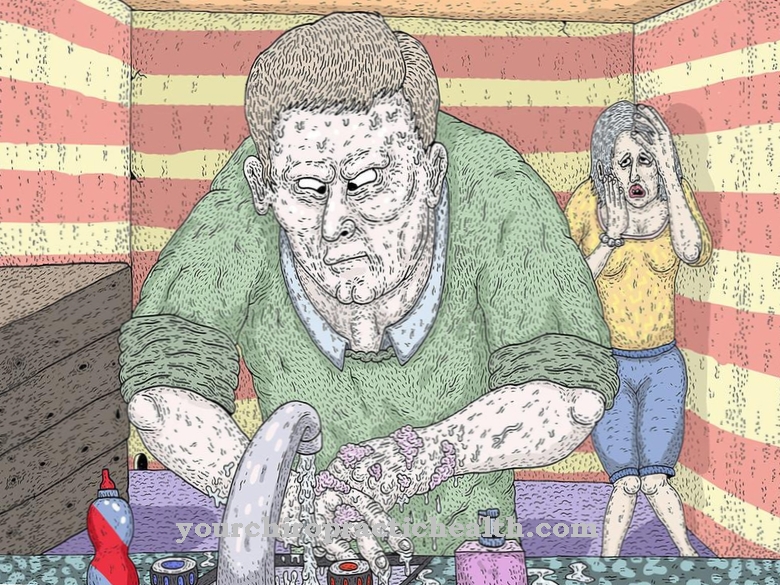The SSRI withdrawal syndrome, a specific withdrawal syndrome, occurs while taking antidepressants (SSRIs) or stopping or reducing the dose. It is characteristic of SSRI withdrawal syndrome that certain physical or psychological withdrawal symptoms develop. Both are also possible. If you take the antidepressant again in the usual amount, the symptoms will quickly subside.
What is SSRI withdrawal syndrome?

© 1STunningART - stock.adobe.com
At the SSRI withdrawal syndrome it is a complex of symptoms that occurs when the SSRI, a selective reuptake inhibitor, is suddenly discontinued. Due to the long-term administration of SSRIs, the most frequently used antidepressant, there is an increased concentration of serotonin in the CSF. From this a tolerance develops in the body, since the organism adapts accordingly to the increased serotonin values.
If the SSRI is suddenly no longer taken, this leads to a serotonin deficiency. As a result, the symptoms develop, but they cannot be compared with an addiction reaction, since the SSRIs are not addictive. In the transition phase in which the withdrawal symptoms appear, a new balance is created. This phase can be of different lengths and the symptoms are also differently pronounced.
causes
How exactly the SSRI withdrawal syndrome is triggered has not yet been sufficiently clarified. A homeostasis disorder is suspected, i.e. that an artificial stable state arises due to the constant use of the SSRI. However, if the antidepressant is removed, the body becomes imbalanced. The trigger for the symptoms is the hormonal disorder caused by withdrawal from the SSRI.
Serotonin, the messenger substance, and its receptors have numerous functions in the body, which explains the many different withdrawal symptoms. The serotonin transporter is no longer blocked after the drug is discontinued, so that the serotonin is reabsorbed more intensely in the nerve cells and the serotonin concentration drops relatively suddenly. The receptors do not change immediately because these processes take days to weeks.
As a result, an imbalance arises, which leads to the symptoms. The person's expectations and fears do not play a role as triggers, but they do have an impact on how the SSRI withdrawal syndrome is experienced, perceived and managed. The duration of use of the antidepressant can also promote the development of SSRI withdrawal syndrome. From four weeks onwards, there is a risk that the SSRI withdrawal syndrome will develop if the intake of the substance is stopped.
Symptoms, ailments & signs
The SSRI withdrawal syndrome is associated with various physical and / or psychological complaints. These include sleep disorders, because serotonin regulates sleep. Since the messenger substance serotonin also acts on the gastrointestinal tract and there are numerous serotonin receptors in the intestinal mucosa, diarrhea or constipation can occur if the antidepressant is suddenly stopped.
Other symptoms that can occur with SSRI withdrawal syndrome are circulatory problems, dizziness, balance disorders, sensory disorders, physical malaise, mood swings, muscle cramps, aggressive behavior, severe depression, mania and even thoughts of suicide.
In addition, some patients, especially those taking long-term medication or high doses, may experience long-term symptoms such as mild confusion, poor short-term memory, difficulty concentrating, and tinnitus even after the SSRI withdrawal syndrome has ended.
Severe symptoms such as psychomotor restlessness, depersonalization, sexual dysfunction, and extreme anxiety are possible. Patients have reported that long-term symptoms in SSRI withdrawal syndrome should improve significantly within two years of discontinuation of SSRIs.
Diagnosis & course of disease
If SSRI withdrawal syndrome is suspected, it is possible to confirm the diagnosis with the help of a validated symptoms checklist (DESS). This was developed in clinical studies and effectively helps to correctly record the withdrawal symptoms. It is advisable to work through the list before the SSRIs are sent.
Subsequently, the statements can be compared with the symptoms that occur after stopping the antidepressant. The purpose of this is to avoid distortion caused by a lack of memory on the part of the patient. If at least three withdrawal symptoms appear or worsen, SSRI withdrawal syndrome is present.
Complications
The SSRI withdrawal syndrome causes various physical and psychological complaints. Due to the serotonin deficiency, many people can experience sleep disorders and occasionally gastrointestinal complaints such as diarrhea or constipation. In the further course of the disease, circulatory problems as well as balance and sensation disorders can occur, which increase the risk of accidents and falls.
Possible psychological complications range from mood swings to manic depression and suicidal ideation. Extreme anxiety, depersonalization, and sexual dysfunction are also possible. In some patients, SSRI withdrawal syndrome has long-term effects such as difficulty concentrating, tinnitus and poor short-term memory. Usually these long-term symptoms persist for one to two years before they gradually subside.
Serious complications are unlikely to occur during treatment. However, the drugs typically prescribed occasionally cause side effects. Benzodiazepines can lead to memory, perception and reaction disorders. Headaches and drowsiness are also typical symptoms.
There is also the risk of drug addiction. Stopping the medication quickly can cause mental disorders such as depressive moods or mania. The use of antidepressants can cause fatigue, personality changes and occasionally gastrointestinal complaints.
When should you go to the doctor?
Treatment by a doctor is always necessary for SSRI withdrawal syndrome. Self-healing cannot occur, so treatment by a doctor is essential. This is the only way to prevent and limit further complications. A doctor should be consulted if the person concerned shows the usual symptoms of withdrawal from the drug. This often leads to diarrhea or constipation, which can also cause severe sleep problems. Should these symptoms occur, a doctor should be consulted.
Feeling dizzy or cramping in the muscles can also indicate SSRI withdrawal syndrome and should be examined by a doctor. It is also not uncommon for those affected to have confusion or tinnitus. Anxiety can also indicate the syndrome and must be examined by a doctor.
The diagnosis and treatment of SSRI withdrawal syndrome is usually done by a psychologist. Whether there will be a complete healing cannot be universally predicted. However, life expectancy is usually not restricted.
Treatment & Therapy
Treatment of symptoms depends on the severity of the SSRI withdrawal syndrome causing the withdrawal symptoms. It also plays a role whether further treatment with antidepressants is planned after the SSRI has been discontinued. In the latter case, reintroducing the medication usually leads to success.
For patients who no longer take antidepressants, the therapy depends on the severity of the symptoms. In mild cases, calming down and relaxing can be helpful. Moderate withdrawal symptoms are often treated with benzodiazepines.
In cases where SSRI withdrawal syndrome causes severe symptoms, it may be successful if the medication is restarted and the SSRIs are later withdrawn in smaller steps. Switching to a long-acting SSRI that is easier to stop can also help.
You can find your medication here
➔ Medicines against depressive moods & to lighten the moodprevention
The SSRI withdrawal syndrome can be prevented by the fact that antidepressants should generally never be stopped suddenly. Basically, treatment with the drug must be gradually ended. This means that the dose should be gradually reduced before stopping.
A minimum of two to four weeks for tapering SSRIs is generally recommended. This tapering reduces the likelihood of SSRI withdrawal syndrome, but it is not safe to prevent it.
Aftercare
Follow-up care for SSRI withdrawal symptoms depends on the severity of the withdrawal symptoms. If these are only easy, relaxation methods will help. If the severity is moderate, patients should adhere to the doctor's recommendations for taking the benzodiazepines. In severe cases, doctors often advise taking the medication again. It is very important to follow the recommended medication exactly.
The later withdrawal takes place in small steps. If necessary, the doctor may suggest follow-up treatment with antidepressants. Abrupt discontinuation is generally not advisable, so that patients should expect a withdrawal phase of two to four weeks. So you need patience to reduce the syndrome if possible. Exercising, preferably outdoors, makes them feel distracted and no longer perceive the symptoms as clearly.
Exercise also helps regulate the metabolism. The activation of serotonin leads to a better mood of those affected, at the same time they regain more control over their body. Patients often suffer from lack of sleep, but activities in the fresh air tend to make them tired and therefore find it easier to rest and fall asleep. Regular rest periods promote a regular sleep rhythm.
You can do that yourself
In the case of a clearly diagnosed SSRI withdrawal syndrome, the attending physician or psychologist will treat symptomatically and, if necessary, prescribe medication depending on the severity of the symptoms. They may also recommend another SSRI, which is easier to stop after a certain period of treatment.
Patients who want to consistently forego an SSRI in the future should be very patient, as it can take a relatively long time for the serotonin balance in the body to be balanced again without the influence of medication. The most helpful things you can do with SSRI withdrawal syndrome are exercise and plenty of exercise in the fresh air. On the one hand, sporting activities distract from the symptoms; on the other hand, exercise regulates the metabolism and activates serotonin production. This improves both mood and body awareness.
At the same time, enough exercise makes you tired, which is particularly helpful for patients who suffer from a lack of sleep as a symptom. They also have to set up regular rest times and always go to bed at the same time. After a while, your body will regain a regular sleeping and waking rhythm.
According to the latest research, a healthy diet also helps with disorders in the serotonin balance and the resulting tendency to depression.

.jpg)

























